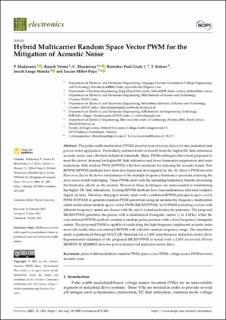| dc.contributor.author | Madasamy, P. | |
| dc.contributor.author | Verma, Rajesh | |
| dc.contributor.author | Bharatiraja, C. | |
| dc.contributor.author | Barnabas, Paul Glady J. | |
| dc.contributor.author | Srihari, T. | |
| dc.contributor.author | Munda, Josiah Lange | |
| dc.contributor.author | Mihet-Popa, Lucian | |
| dc.date.accessioned | 2021-06-23T11:29:24Z | |
| dc.date.available | 2021-06-23T11:29:24Z | |
| dc.date.created | 2021-06-12T21:33:21Z | |
| dc.date.issued | 2021 | |
| dc.identifier.citation | Electronics. 2021, 10(12), Artikkel 1483. | en_US |
| dc.identifier.issn | 2079-9292 | |
| dc.identifier.uri | https://hdl.handle.net/11250/2760864 | |
| dc.description.abstract | The pulse width modulation (PWM) inverter is obvious for any industrial and power sector application. Particularly industrial drives are very keen on the industrial standards. Many modulations approached such a drives objects of DC-link consumption, harmonics suppression in lower and higher order spectrum and noise reduction. The still random PWM is a best candidate for reducing the noises on the PWM operated AC drives. There are various Random PWM (RPWM) methods has been developed and investigated for the PWM inverter fed drive noise reductions, still the shortcomings are existence on these method items of their less randomness and complex digital circuitry. These PWM dealt the spreading harmonics there by decreasing harmonic effects on the system. However, these techniques overlook the effect of acoustic noise and DC -link utilizations Therefore, in this paper mainly deals with to combined RPWM principle in space vector PWM (SVPWM) to generate random PWM generation using asymmetric frequency multi carrier called multicarrier random space vector PWM (MCRSVPWM). The SVM agreements with multicarrier (different fixed frequencies as carrier waves) which are chosen with the aid of a random binary bit generator. The proposed RSVM generated pulses with a randomized triangular carrier (4 ± 1.5 kHz), while the conventional RPWM method contains of the random pulse position with a fixed frequency triangular carrier. The simulation study is performed through MATLAB/Simulink for 3 HP asynchronous induction motor drive. The Experimental validation of proposed MCRSVPWM is tested with 2kW six switch (Power MOSFET – SCH2080KE) inverter power module fed induction motor drive. | en_US |
| dc.language.iso | eng | en_US |
| dc.publisher | MDPI | en_US |
| dc.rights | Navngivelse 4.0 Internasjonal | * |
| dc.rights.uri | http://creativecommons.org/licenses/by/4.0/deed.no | * |
| dc.subject | pulse width modulation | en_US |
| dc.subject | random PWM | en_US |
| dc.subject | space vector PWM | en_US |
| dc.subject | voltage source PWM inverter | en_US |
| dc.subject | acoustic noise | en_US |
| dc.title | Hybrid Multicarrier Random Space Vector PWM for the Mitigation the Acoustic Noise | en_US |
| dc.type | Peer reviewed | en_US |
| dc.type | Journal article | en_US |
| dc.description.version | publishedVersion | en_US |
| dc.rights.holder | © 2021 by the authors. | en_US |
| dc.subject.nsi | VDP::Teknologi: 500 | en_US |
| dc.source.volume | 10 | en_US |
| dc.source.journal | Electronics | en_US |
| dc.source.issue | 12 | en_US |
| dc.identifier.doi | 10.3390/electronics10121483 | |
| dc.identifier.cristin | 1915423 | |
| dc.source.articlenumber | 1483 | en_US |
| cristin.ispublished | false | |
| cristin.fulltext | original | |
| cristin.qualitycode | 1 | |

